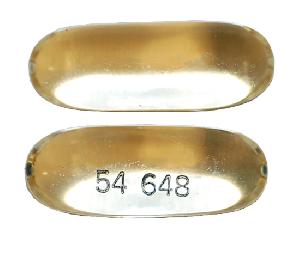Icosapent Side Effects
Applies to icosapent: oral capsule liquid filled.
Serious side effects of icosapent
Along with its needed effects, icosapent may cause some unwanted effects. Although not all of these side effects may occur, if they do occur they may need medical attention.
Check with your doctor immediately if any of the following side effects occur while taking icosapent:
Less common side effects
- dizziness
- fainting
- fast or irregular heartbeat
- lightheadedness
- swelling of the hands, ankles, feet, or lower legs
- unusual bleeding
Other side effects of icosapent
Some side effects of icosapent may occur that usually do not need medical attention. These side effects may go away during treatment as your body adjusts to the medicine. Also, your health care professional may be able to tell you about ways to prevent or reduce some of these side effects.
Check with your health care professional if any of the following side effects continue or are bothersome or if you have any questions about them:
Less common side effects
- constipation
- difficulty with moving
- muscle pain or stiffness
- pain in the joints
- pain in the mouth or throat
Incidence not known
- diarrhea
- pain in the arms or legs
- stomach discomfort
For healthcare professionals
Applies to icosapent: oral capsule.
General adverse events
The more commonly reported adverse reactions in the cardiovascular outcome trial included bleeding, musculoskeletal pain, peripheral edema, constipation, gout, rash, and atrial fibrillation. The more commonly reported adverse reactions in the hypertriglyceridemia trials included arthralgia and oropharyngeal pain.[Ref]
Cardiovascular
- Common (1% to 10%): Atrial fibrillation/flutter
During a clinical trial in statin-treated patients with established cardiovascular disease (CVD) or diabetes plus an additional risk factor for CVD, atrial fibrillation or atrial flutter occurred in 5.8% of patients receiving this drug compared with 4.5% of placebo-treated patients; adjudicated atrial fibrillation or atrial flutter requiring hospitalization for at least 24 hours occurred in 3% of patients receiving this drug compared with 2% of placebo-treated patients. Atrial fibrillation and atrial flutter were reported more often in patients with history of atrial fibrillation or atrial flutter receiving this drug than in those receiving placebo (12.5% vs 6.3%).
Dermatologic
- Common (1% to 10%): Rash, contusion
Gastrointestinal
- Common (1% to 10%): Constipation, eructation, gastrointestinal bleeding
- Postmarketing reports: Diarrhea, abdominal discomfort
In a cardiovascular outcomes trial, constipation was reported in 5.4% of patients receiving this drug compared with 3.6% of placebo-treated patients; serious constipation was less common for this drug (0.1%) and placebo (0.2%). The relative incidence of constipation in this study may have been confounded by a residual laxative effect for placebo, which comprised a subtherapeutic dose of light mineral oil (4 mL).
Genitourinary
- Common (1% to 10%): Hematuria
Hematologic
- Very common (10% or greater): Bleeding event (up to 12%)
- Common (1% to 10%): Serious bleeding event
- Frequency not reported: Prolonged bleeding time
During clinical trials in patients with established CVD or diabetes plus an additional risk factor for CVD, a bleeding event occurred in 11.8% of patients receiving this drug compared to 9.9% of placebo-treated patients. Serious bleeding events occurred in 3.4% of patients receiving this drug compared to 2.6% of placebo-treated patients when coadministered with an antithrombotic agent, but were reported at a similar rate (0.2%) in patients not taking a concurrent anticoagulant/antiplatelet agent.
The bleeding events reported most often were gastrointestinal bleeding (3.1%), contusion (2.5%), hematuria (1.9%), and epistaxis (1.5%).
Some published studies with omega-3 fatty acids have demonstrated prolongation of bleeding time. The prolongation of bleeding time reported in those studies did not exceed normal limits and did not produce clinically significant bleeding episodes.
Hypersensitivity
- Uncommon (0.1% to 1%): Hypersensitivity
Metabolic
- Common (1% to 10%): Gout
Musculoskeletal
- Common (1% to 10%): Arthralgia, musculoskeletal pain
- Postmarketing reports: Pain in the extremities
Nervous system
- Uncommon (0.1% to 1%): Dysgeusia (i.e., fishy taste)
Other
- Common (1% to 10%): Peripheral edema
- Postmarketing reports: Increased blood triglycerides
Respiratory
- Common (1% to 10%): Oropharyngeal pain, epistaxis
- Frequency not reported: Pharyngeal swelling
References
1. (2019) "Product Information. Vascepa (icosapent)." Amarin Pharmaceuticals Inc, SUPPL-35
2. (2022) "Product Information. Vazkepa (icosapent ethyl)." Amarin Pharmaceuticals Ireland Ltd
Frequently asked questions
More about icosapent
- Check interactions
- Compare alternatives
- Reviews (125)
- Drug images
- Dosage information
- During pregnancy
- Drug class: miscellaneous antihyperlipidemic agents
- En español
Patient resources
Other brands
Professional resources
Other brands
Related treatment guides
Further information
Icosapent side effects can vary depending on the individual. Always consult your healthcare provider to ensure the information displayed on this page applies to your personal circumstances.
Note: Medication side effects may be underreported. If you are experiencing side effects that are not listed, submit a report to the FDA by following this guide.

